THE EDUCATION SECTOR IN GHANA
About Ghana
Ghana is a country in West Africa bordering Burkina Faso, Côte d’Ivoire, and Togo. Ghana is a diverse and multilingual nation, with numerous languages and dialects spoken throughout the country. However, English is the lingua franca and official language, as well as the formal language of instruction at all levels of education. However, indigenous languages are also used in elementary schools, depending on the region. Ghana’s education sector has evolved and grown steadily over the past decades.
Overview of Ghana’s Education System
Takyi, Amponsah, Asibey, and Ayambire, (2019) write that, Ghana’s current education system has its roots in its political past. Akyeampong, Djangmah, Seidu, Oduro, and Hunt (2007) also explain that, the educational system during the colonial era was aimed at enhancing the activities of Christian Missionaries, educating the children of European traders and sustaining the machinery of colonial government. However, less than a decade to independence and the post-independence era saw massive investments in formal education to propel Ghana towards socio-economic development. The restructuring of Ghana’s Education system led to reforms like the introduction of vocational and technical subjects at the Junior Secondary School level to make education more work-oriented; and the introduction of the Free Compulsory Universal Basic Education to improve enrolment and retention.
Presently, Ghana’s educational system consists of pre-school, kindergarten and junior high school, together forming the basic education cycle, followed by a 3-year senior high school cycle. This is followed by a tertiary education sector, consisting of training colleges, technical institutes, public and private universities. Additionally, there are specialized post-secondary education institutions in the public sector, including the Ghana Institute of Journalism, the Institute of Local Government Studies and the Regional Maritime University. There are also polytechnics and technical universities in the tertiary sector. With the polytechnics, there is a gradual process to convert them into universities, as part of a wide-ranging policy of enhancing technical education, with government, donor and international financial institution all playing vital roles.
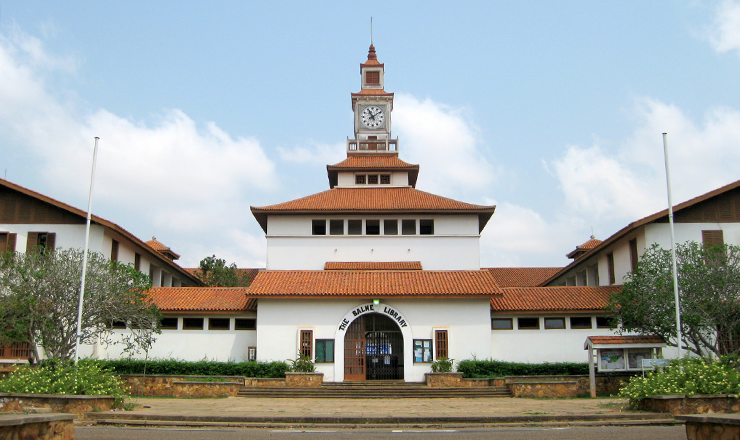
Ghana’s First University: The University of Ghana
BASIC EDUCATION
Ghana’s school system is patterned after the British system, but underwent a number of changes over the past 60 years. Before 1974, for instance, the system was structured into six years of elementary education and four years of secondary education. The select few students who went on to higher education then had to complete a two-year UK-based advanced level (A-level) university-preparatory curriculum before enrolling in three-year undergraduate programs (6+4+2+3). At present, the system is divided into six years of elementary education and three years of junior secondary education (jointly referred to as basic education), followed by three of senior secondary education and standard four-year university programs (6+3+3+4). Basic education until grade nine is free and compulsory for all Ghanaian children.
Elementary education in Ghana begins at the age of six and is free at public schools. The elementary school curriculum focuses on developing basic reading and writing abilities, arithmetic and problem-solving skills. The subjects taught include English, local languages in early grades, mathematics, social studies, integrated science, arts, physical education and civics. Elementary education concludes with the completion of grade six.
Junior secondary education is open to all students who complete elementary education – there are no entrance examinations. It lasts three years (grades seven to nine, or forms I to III) and concludes with the Basic Education Certificate Exam (BECE). The BECE subjects include English, Ghanaian language and culture, social sciences, integrated science, mathematics, design and technology, religion and civics, information technology, and French as an optional subject. It is administered by the WAEC in June each year for ninth graders who have been approved by the Ghana Education Service to sit for it. There are a number of international schools in Ghana, offering alternative curriculums to Ghana’s basic education.

Basic School Students in Class
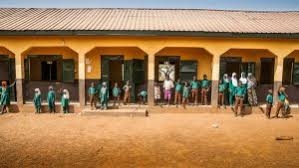
Basic School Premises
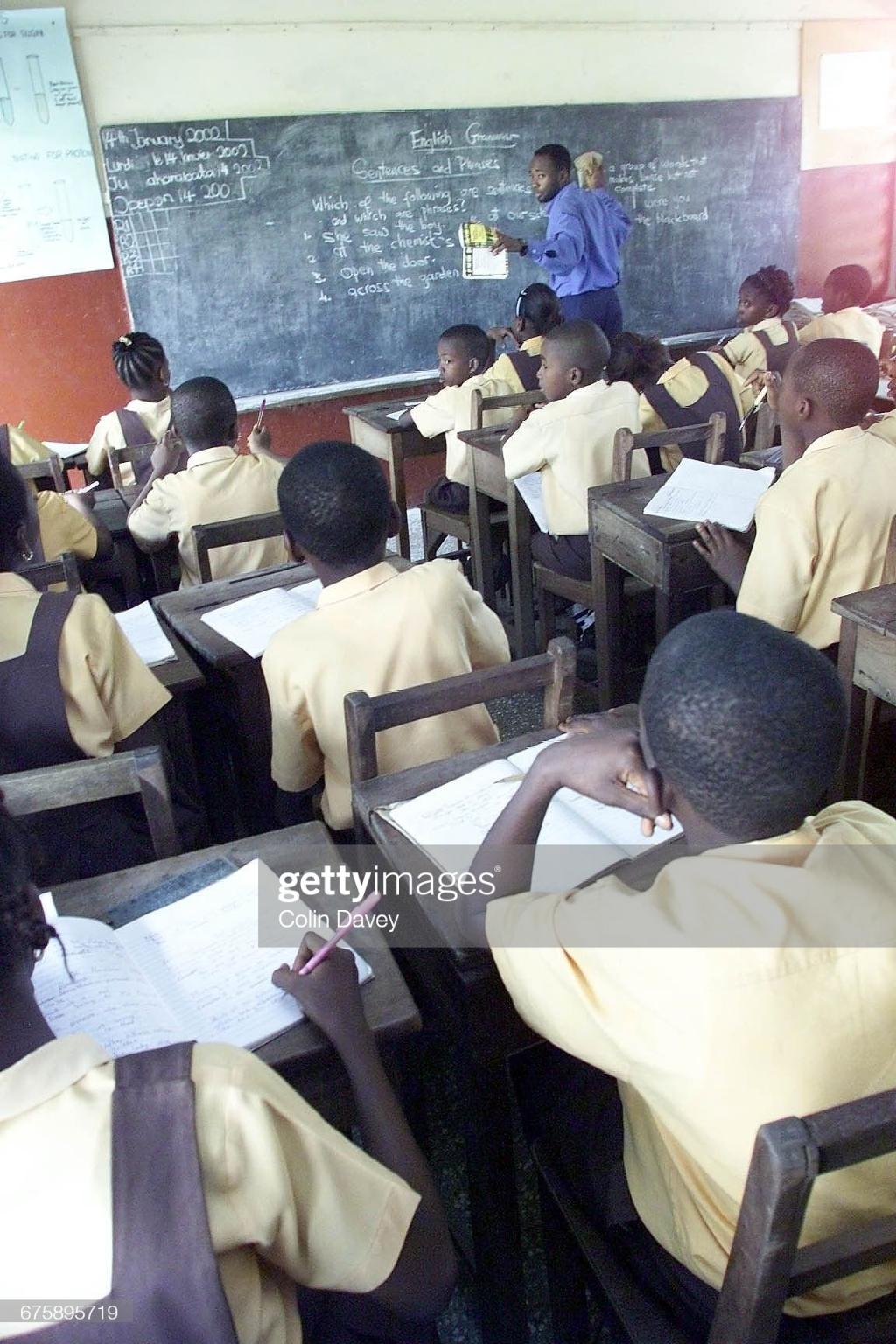
Basic School Students in Class
Secondary Level Education
A computerized school selection placement assigns the vast majority of graduates from basic education who wish to continue their education to senior secondary schools. Admission is competitive, and only the best students have the option of attending the school of their choice. Although several attempts have been made in recent years to extend senior secondary education to four years in order to allow students more time to prepare for final exams, these changes have failed, and Ghana's upper secondary education continues to last three years (from grades 10 to 12). The program contains core subjects that must be completed as well as electives from the following specialization streams: general (with separate arts and science options), agriculture and environmental studies, industry, vocational, and technical.
WAEC administers senior high school graduation exams. Ghana resorted to the pan-regional West African Senior School Certificate Examination (WASSCE) in 2007. The eligible candidates sit for the exams in May/June, but private candidates may also register separately (for a separate test in October/November). They cover four mandatory core subjects – English, integrated science, mathematics, and social sciences. In addition, candidates are examined in subjects from their respective specialization track, including three to four electives.
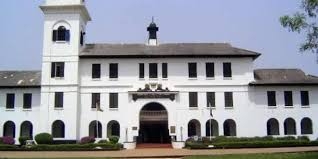
Achimota School: One of Ghana’s premier high schools
Higher Education
Ghana’s higher education is filled with universities, colleges and institutes. The types of higher education institutions in Ghana include public universities, technical universities, and university-level professional training institutions. The University of Ghana, KNUST, and the University of Cape Coast are among the most prominent institutions in the country. However, liberalization of education laws has seen the emergence of private universities like Ashesi University, Webster University, Valley View University, Central University, etc. In addition to universities, there are various teacher training colleges, nursing colleges and university colleges that do not have standalone degree-awarding authority, but offer undergraduate programs in affiliation with universities, which are often undergraduate programs geared towards employment. The vast majority of private HEIs are university colleges.
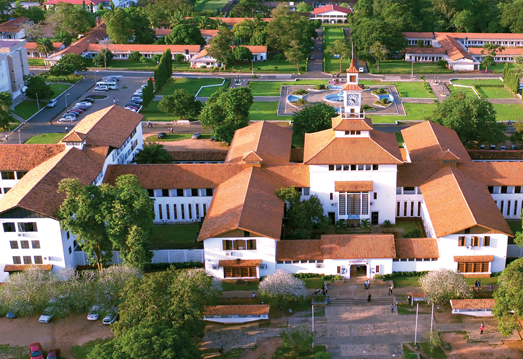
The University of Ghana
Supervision of Education
The Ministry of Education, a supervisory body for the education sector exists with the vision to prepare and equip all Ghanaians with relevant education and skills to promote socio-economic development. Its mission is to formulate and implement policies that will provide quality, equitable and accessible education to all citizens, with emphasis on Science, and Information Communication Technology (ICT) for self-actualization and peaceful coexistence, as well as to provide the requisite skills for the labor market.
The policies of the sector are implemented through the under listed agencies;
i. Ghana Education Service (GES) (in charge of implementation of pre-tertiary education policies)
ii. National Council for Tertiary Education (NCTE) (in charge of implementation of tertiary education policies)
iii. National Accreditation Board (NAB)
iv. Ghana Library Authority (GhLA)
v. Ghana Book Development Council (GBDC)
vi. National Board for Professional and Technicians Examination (NABPTEX)
vii. Encyclopaedia Africana (EA)
viii. Ghana Academy of Arts and Sciences (GAAS)
ix. Council for Technical Vocational Education and Training (COTVET)
x. The Students’ Loan Trust Fund (SLTF)
xi. National Inspectorate Board (NIB)
xii. National Teaching Council (NTC)
xiii. National Council for Curriculum Assessment (NCCA)
xiv. Centre for National Distance Learning and Open Schooling (CENDLOS)
xv. The West African Examination Council (WAEC)
xvi. National Service Scheme (NSS)
xvii. Ghana National Commission for UNESCO
xviii. Ghana Education Trust Fund
xix. Non-Formal Education Division (NFED)
xx. Non-Governmental Organisations (NGOs)
REFERENCES
Akyeampong, K., Djangmah, J., Seidu, A., Oduro, A., & Hunt, F. (2007). Access to basic education in Ghana: The evidence and the issues. Brighton: CREATE Country Analytic Review: University of Sussex.
Takyi, S. A., Amponsah, O., Asibey, M. O., & Ayambire, R. A. (2019). An overview of Ghana’s educational system and its implication for educational equity. International Journal of Leadership in Education, 1–26. doi:10.1080/13603124.2019.1613565
(Doreen Wang,Assistant Researcher of CWAS,School of Public Affairs and Administration of UESTC)
Please refer to the Chinese Version published on Huanqiu.com, one of the top three rating news media in China. Huanqiu.com is a national rating on line media platform, approved by the publisher of People's Daily and the Central Internet Information Office of China. This column is to provide a platform for researchers and practitioners on West African issues.
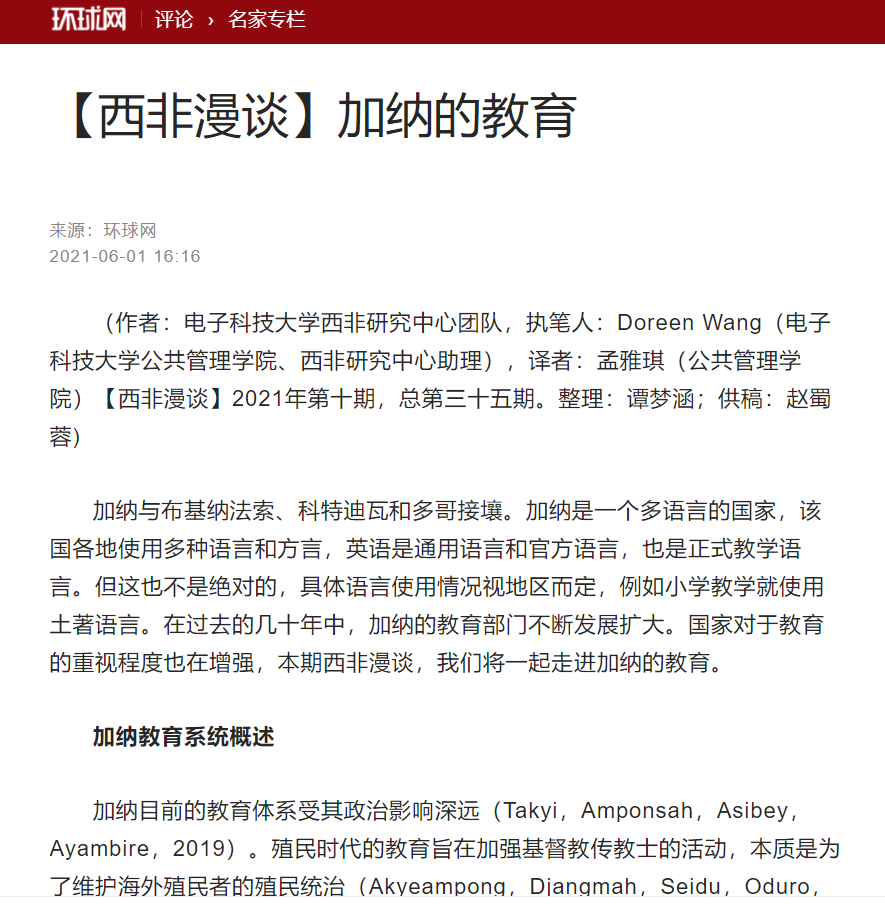
Link:https://opinion.huanqiu.com/article/43MPrVZssIp